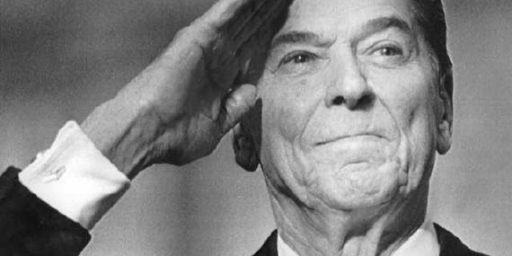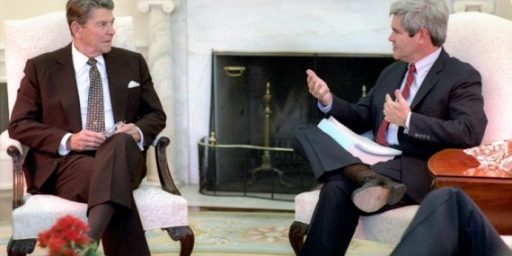ONE TERMER?
Stephen Green thinks President Bush needs to be careful:
being a big-government conservative, to us domestic Jeffersonians, means combining the worst Mrs. Grundy aspects of the Republicans with the worst of the profligate-spending habits of the Democrats.
Also left unsaid is the dangerous tightrope Bush walks as a BGC. One misstep, and he could energize the Democrat base while alienating his own. That means that if Karl Rove doesn’t maintain his near-perfect track-record, W could follow the footsteps of the last BGC — his father — and be a one-term President.
Could well be. He’s certainly been rather annoying with regard to domestic politics for those of us who are fiscal conservatives. I think what saves Bush II is that, unlike his father, he’s got very strong support among the religious conservatives. That’s the part of the base most likely to sit on the sidelines if not motivated. The libertarian-economic conservative part of the base tends to vote regardless and, frankly, isn’t going to have much alternative to Bush. I mean, I oppose steel tariffs and farm subsidies, but not enough to turn the national security apparatus to Howard Dean.
There are a couple of related stories in the current Atlantic Monthly. Pat Buchanan–whom I’m surprised to see in this magazine–addresses the inevitability question. He makes an odd assertion given his own history:
In retrospect, the senior Bush was a successful President. In his first year he liberated Panama and the Berlin Wall came down. In his second he cobbled together a twenty-eight-nation coalition to drive Saddam Hussein out of Kuwait. In his third he won the most decisive victory in U.S. military history, persuaded the Arabs to sit down with the Israelis at Madrid, and godfathered the reunification of Germany. Entering 1992, he could claim credit for having presided over America’s successful conclusion of the Cold War and having helped to liberate 100 million people in Eastern Europe.
When Norman Schwarzkopf’s triumphant Army of Desert Storm marched up Constitution Avenue in the victory parade in June of 1991, George Bush’s approval rating had recently peaked, at 91 percent. Six months later Bush was scrambling to stave off humiliation in New Hampshire. The following November he was defeated, collecting only 37 percent of the vote. What went wrong?
Like Winston Churchill in July of 1945, Bush was a victim of his own and his country’s success. With the defeat of communism, the Cold War coalition that had given the Republicans five victories in six presidential elections—and two forty-nine-state landslides—dissolved. Foreign policy, Bush’s long suit, ceased to be central to national politics. As a voting issue it was off the table in 1992.
A second cause of Bush’s defeat was the alienation of his base. The right had savaged Bush in 1980, when he made the strongest run of all the candidates seeking to deny Reagan the nomination. Elected President in 1988, he reciprocated, treating conservatives to some of the same dismissive contempt with which they had treated him—not only in his appointments but in his policies.
He correctly notes,
The son, who saw all this happen, has gone to school on his father’s mistakes and learned his lessons well.
Whereas his father broke his pledge and raised taxes, George W. has midwifed two of the three largest tax cuts in history. Whereas the father was contemptuous of conservatives, the son has courted them. Whereas the father vacationed in Kennebunkport, the son goes home to Crawford. Whereas the father is all Yale Yankee, the son is Midland-Odessa. Indeed, aides assure conservatives that although he remains his father’s son, in his politics and policies George W. is Reagan’s true heir.
Jack Beatty, in an article not available online, doesn’t address Bush’s re-electability so much as whether a second term is a good idea. He notes that the “tradition” of second terms, established by Washington, is actually not much of a tradition at all because so few presidents get them. Further, they are almost always accompanied by a scandal or monumental failure of some sort: Wilson and the League of Nations, FDR and court packing, Nixon and Watergate, Reagan and Iran-Contra, and Clinton and Lewinski.






Buchanan is party right. The senior Bush alienated his base, and a lot of independents, when he broke the “No new taxes” pledge. Otherwise, he pandered to the Buchananites throughout his administration and surrendered to Buchanan himself when he gave Buchanan a prime time slot to make an incredibly hate-filled speech. It was the wrong speech at the wrong time and Bush’s failure to distance himself from it and Buchanan cost him dearly.
—